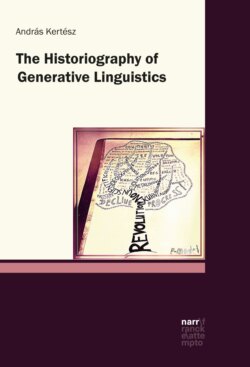Читать книгу The Historiography of Generative Linguistics - András Kertész - Страница 31
На сайте Литреса книга снята с продажи.
2.4.2 No revolution
ОглавлениеIn 1993 and 1994, a fierce debate was published in Zeitschrift für Sprachwissenschaft. The target of JägerJäger, Ludwig’s article (Jäger 1993a) was ChomskyChomsky, Noam’s cognitivismcognitive, which was declared in his work after the appearance of Syntactic StructuresSyntactic Structures and had become powerful in the Theory of Government and BindingGovernment and Binding, Theory of, as well as its widespread application by the beginning of the 1980s. Jäger’s thesis is this:
| (T18) | The dominance of the Theory of Government and BindingGovernment and Binding, Theory of significantly contributed to the declinedecline of linguistics and the erosionerosion of its object of investigation. |
JägerJäger, Ludwig’s first argument for (T18) is that the dominance of generative linguistics is a consequence of importing methodological principles from the natural sciencesciencenaturals. Jäger points out that linguistics used the same procedure at each stage in the course of its historyhistory in so far as it redefined its object of investigation, i.e. ›languagelanguage‹, by importing methodological principles and theoretical schemes in accord with the current development stage of the natural sciences.1 During this procedure, linguistics demonstrates the current stage of the natural sciences as an example to be followed, and as a final stage of maturity to be achieved. According to Jäger (1993a: 83–84), early Indo-European linguistics is characterized by adjusting to the current status of the natural sciences – Spencer’s organology and Darwin’s theorytheory of evolutionevolution. The school of the neogrammarians considered Comte’s positivism as an example to be followed. ChomskyChomsky, Noam’s linguistic theory adjusts to the cognitivecognitive sciences. When faced with the challenge posed by the natural sciences, linguistics responded by identifying itself with the ›aggressor‹ and took over the approach that appeared to be progressive (Jäger 1993a: 92). In the case of Government-BindingGovernment and Binding, Theory of Theory, this was cognitivism. However, Jäger claims that the ›real‹ object of linguistics can be grasped by the hermeneutic-functionalhermeneutic-functional tradition, which examines ›human‹ communication, as embedded in the complex system of its socialsocial and historical environment. Therefore, the extreme scientismscientism of the Chomskyan theories, which excluded the kind of linguistics that belonged to the hermeneutic-functional tradition, leads to the declinedecline of linguistics.
Second, JägerJäger, Ludwig finds it paradoxical that while, on the one hand, cognitivecognitive science, according to its own judgment, has made much progressprogress regarding the analysis of particular aspects of languagelanguage, on the other hand, as a result of this ›progress‹, linguistics has lost control over its object of research, namely, the definition of ›language‹ (Jäger 1993a: 90). As a consequence of the rigid adjustment to the methodologymethodology of the natural sciencesciencenaturals, referred to as the ›aggressor‹, the historyhistory of the Chomskyan theories is nothing but the history of the erosionerosion of ›language‹, as the object of linguistics (Jäger 1993a: 79). In the course of this process, the object of research has narrowed down to such an extent that linguistics is not even capable of retaining its disciplinary identity.
Third, similarly to AarsleffAarsleff, Hans (1970), KoernerKoerner, E.F. Konrad (1989), (2002) and (2004), as well as MurrayMurray, Stephen O. (1994), JägerJäger, Ludwig claims that generativists rewrite the historyhistory of linguistics in a biasedbias manner. They highlight only scientisticscientism views by glorifying them and hiding their shortcomings. In this way, they also distort or simply deny the progressive elements of theories belonging to the hermeneutic-functionalhermeneutic-functional tradition without which, however, modern linguistics could not have come into existence.2
JägerJäger, Ludwig offers the following solution to (P):
| (SP18) | The basic terms of the historiographyhistoriography of generative linguistics are ›erosion‹erosion and ›decline‹decline with respect to the Theory of Government and Binding,Government and Binding, Theory of its central hypothesis is (T17) and its framework is comparison to the hermeneutic-functionalhermeneutic-functional tradition. |
